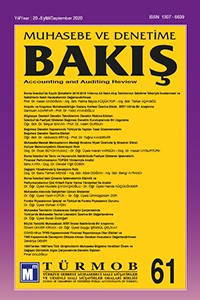Öz
Bu çalışmada, İstanbul Menkul Kıymetler Borsasına kote olmuş ve BİST100’de yer alan şirketlerin koşullu ve koşulsuz muhafazakârlık ile kazanç kalitesi arasındaki ilişki araştırılmıştır. Örneklem 2009 ile 2018 arasında 41 şirketten oluşmakta ve bu dönemler arasında bankalar, finans kuruluşları ve aktif olmayan veya verileri eksik olan firmalar kapsam dışı bırakılmıştır. Araştırma hipotezlerini test etmek için 1997 yılında geliştirilen Basu modeli kullanılmıştır. Bu modele 2011 yılında Tariq ve Rasha tarafından “işletme faaliyetlerinden sağlanan nakit akışının firmanın net karına oranı” ile “piyasa değerinin defter değerine oranı” değişkenleri eklenmiş ve model genişletilmiştir. Çalışmada genişletilmiş Basu modeli aracılığıyla koşullu ve koşulsuz muhafazakârlığın kazanç kalitesi üzerine etkisi ölçülmüştür. Verilerin analizinde Panel Veri yöntemi kullanılmıştır. Elde edilen analiz sonuçlarına göre koşullu ve koşulsuz muhafazakârlık ile kazanç kalitesi arasında istatistiksel olarak anlamlı negatif bir ilişkinin olduğu görülmüştür.
Anahtar Kelimeler
: Koşullu muhafazakârlık Koşulsuz Muhafazakârlık kazanç kalitesi
Kaynakça
- Adıgüzel, H. (2017). Türkiye’de Uluslararası Finansal Raporlama Standartlarına Uyumun Firmaların Kazanç Kalitesi Üzerine Etkisi. Muhasebe ve Denetime BAKIŞ, 51(Nisan/April), 103-114.
- Asri, M. (2017). The Effect of Accounting Conservatism on Earning Quality. Available at SSRN: https://ssrn.com/abstract=2992129 or http://dx.doi.org/10.2139/ssrn.2992129 adresinden alındı
- Ball R., S. L. (2006). The Role of Accruals in Asymmetrically Timely Gain and Loss Recognition. Journal of Accounting Research, 44(2), 207-242.
- Ball, R., Kothari, S.P., Robin, A. (2000). The effect of international institutional factors on properties of accounting earnings. Journal of Accounting & Economics, 29, 1-51.
- Baltagi, B. (2008). Econometric Analysis of Panel Data. West Sussex: John Wiley & Sons.
- Basu, S. (1997). The Conservatism Principle and The Asymmetric Timeliness of Earnings. Journal of Accounting and Economics, 24(1), 3-37.
- Bliss, J. (1924). Management through Accounts. New York: NY: The Ronald Press Co.
- Chan Ann L.-C., L. S. (2009). Accounting conservatism and the cost of equity capital: UK evidence. Managerial Finance, 35(4), 325-45.
- Chandra, U. W. (2004). Income Conservatism in U.S. Technology Sector, The Bradley Policy Research Center. Financial Research and Policy, Working Paper(04-01), 3.
- Chen L. H., F. D. (2014, June). Accounting Conservatism, Earnings Persistence, and Pricing Multiples on Earnings. Accounting Horizons, 28(2), 233-260.
- Darabi R., C. N. (2016). Relation between Conditional and Unconditional Conservatism with Investment Opportunities. Asian Social Science, 12(5), 74-83. http://dx.doi.org/10.5539/ass.v12n5p74 adresinden alındı
- Durak, G. ve Gürel, E. (2014). ''Finansal Raporların Kalitesine Etki Eden Ülkeye Özgü Faktörler''. Muhasebe ve Finansman Dergisi, 64, 95-109.
- FASB, Statement of Financial Accounting Standards (SFAS), No. 132, para.26. (1998).
- Francis J., O. P. (2004). Costs of Equity and Earnings Attributes. THE ACCOUNTING REVIEW, 79(4), 967-1010.
- Givoly D., H. C. (2000). The Changing Time-Series Properties of Earnings, Cash Flows and Accruals: Has Financial Reporting Become More Conservative? Journal of Accounting and Economics, 29, 291.
- Gregory D. Lyimo & salaam, Tanzania. (2014). Conditional Conservatism and its Effect on Earnings Quality and Stock Prices in Indian Capital Market. European Journal of Business and Management, 6(22), 98-104.
- Ha J., F. M. (2018). Conditional conservatism and labor investment efficiency. Journal of Contemporary Accounting & Economics, 14(2), 143-163. doi:https://doi.org/10.1016/J.JCAE.2018.05.002
- Hodge, F. (2003). Investor’ Perceptions of Earnings Quality Investor’ Perceptions of Earnings Quality Investor’ Perceptions of Earnings Quality. Accounting Horizons, 37-48.
- Koçbulut, Ö., & Barış, S. (2016). Avrupa Birliği Ülkelerinde İhracat ve Doğrudan Yabancı Yatırımların Kadın İstihdamı Üzerindeki Etkisi: Panel Veri Analizi. Aydın İktisat Fakültesi Dergisi, 22-39.
- Kutlan, S. (2003). Muhafazakârlık Yaklaşımı ve İhtiyatlılık İlkesinin Kıta Avrupası ve IAS-1 (IFRS-1)-US-GAAP Uygulamaları Açısından Değerlendirilmesi. Yaklaşım Dergisi, Ekim 2003(130), 2.
- Kutlar, A. (2017). E-Views ile Panel Veri Ekonometrisi Uygulamaları. Kocaeli: Umuttepe Yayınları.
- Li, H. (2018). Unconditional Accounting Conservatism and Real Earnings Management. International Journal of Financial Research, 9(2), 203-215.
- Li, Han. (2019). Conservatism, Earnings Management and R&D Capitalization. International Journal of Financial Research, 10(2), 52-62. https://doi.org/10.5430/ijfr.v10n2p52 adresinden alındı
- Lin, Z. J. (1999). Applicability of the Conservatism in China: Empirical Evidence. The International Journal of Accounting, 34(4), 517-537.
- Lyimo, G. D. (2014). Conditional Conservatism and its Effect on Earnings Quality and Stock Prices in Indian Capital Market. European Journal of Business and Management, 6(22), 98-104.
- Oreshkova, H. (2017). The Debate on Prudence in Accounting. CBU International Conference On Innovations In Science And Education, 5, 343-360. https://doi.org/10.12955/cbup.v5.949 adresinden alındı
- Pesaran, M. H. (2004). General Diagnostic Tests for Cross Section Dependence in Panels . Discussion Paper No. 1240, 1-39.
- Pesaran, M. H., Ullah, A., & Yamagata, T. (2008). A Bias‐Adjusted LM Test of Error Cross‐Section Independence. The Econometrics Journal, 105-127.
- Pope, P. E. (2003). Ex-ante and ex-post accounting conservatism, asset recognition and asymmetric earnings timeliness. Working paper, 1-28.
- Ryan, S. G. (2006). Identifying Conditional Conservatism. European Accounting Review, 15(4), 511-525.
- Tariq H. Ismail, Rasha M. Elbolok. (2011). Do Conditional and Unconditional Conservatism Impact Earnings Quality and Stock Prices in Egypt? Research Journal of Finance and Accounting, 2(12), 7-22.
- Tekin, B., Gör, Y. (2018). Şirketlerde Kar Payı Dağıtım Kararı ile Muhasebede Muhafazakarlık Kavramı Arasındaki İlişkinin Analizi: BIST100 Örneği. Uluslararası Yönetim ve Sosyal Araştırmalar Dergisi, 5(9), 47-58.
- Vatanparast M., B. M. (2014). The Relationship Between Conservatism And Earnings Quality In Tehran Stocks Exchange. Indian Journal of Fundamental and Applied Life
- Sciences, 4(1), 1417-1425. http://www.cibtech.org/sp.ed/jls/2014/01/jls.htm adresinden alındı
- Watts, R. L. (2003a). Conservatism in accounting, Part I: explanations and implications. Accounting Horizons, 17(3), 207-221.
Ayrıntılar
| Birincil Dil | Türkçe |
|---|---|
| Konular | İşletme |
| Bölüm | Araştırma Makaleleri |
| Yazarlar | |
| Yayımlanma Tarihi | 15 Eylül 2020 |
| Gönderilme Tarihi | 24 Nisan 2020 |
| Kabul Tarihi | 31 Ağustos 2020 |
| Yayımlandığı Sayı | Yıl 2020 Cilt: 20 Sayı: 61 |


